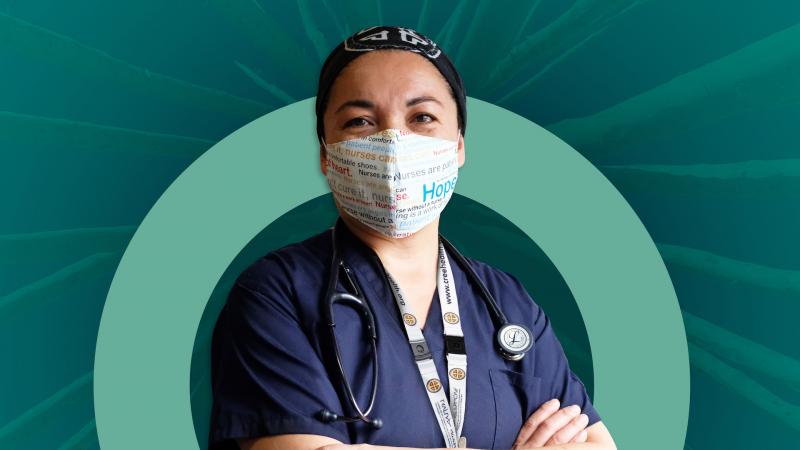Flu and COVID-19: What's the difference?
The flu (influenza) and COVID-19 are both contagious lung infections and lead to similar symptoms, but are caused by different viruses.
-
Flu is caused by infection with the influenza virus. There are two main types of influenza virus called influenza A and influenza B. These two types of the virus change just enough from year to year to evade our immune system and cause a seasonal influenza epidemic.
-
COVID-19 is caused by infection with the 2019 coronavirus, also known as SARS-CoV-2. This virus also evolved into new mutations because it spreads more easily.
Both COVID-19 and flu can spread from person-to-person through droplets or smaller virus particles made when people with the illness cough, sneeze, or talk. The smallest particles may linger in the air, and another person can inhale them and become infected.
-
Usually, the virus spreads between people who are in close contact, within 2 meters or 6 feet, of one another.
-
Isolating when indicated, washing your hands frequently and wearing a medical mask when recommended can help reduce the spread of both COVID-19 and flu viruses.
Did You Know?
It’s possible to get infected with the flu and COVID-19 viruses at the same time. This co-infection may lead to worse health outcomes. Luckily, vaccines are available.
The vaccine for COVID-19 and the vaccine for the flu are different, but you can get them at the same time!
Frequently Asked Questions
The flu and COVID-19 can make people feel the same symptoms (like cough, aches, fever, runny nose, sore throat), but they are different illnesses, caused by different viruses.
It is not possible to tell the flu and COVID-19 apart only by how you feel. Testing yourself when you feel sick is the only way to know if it is COVID-19 or not. Because home COVID-19 tests don’t always find the virus when it is there, often you have to do more than one home test while you are sick to know. It is important to test to know if you have COVID-19 or the flu because it affects what anti-viral medications can be used as treatment.
No, the flu shot does not protect you from COVID-19. The flu shot only protects you from the flu (influenza virus).
-
COVID-19 and the flu are different illnesses, and need different vaccines.
-
The best way to protect yourself against COVID-19, is to be vaccinated with the recommended number of doses.
-
To learn more about COVID-19 vaccination, visit: COVID-19 Vaccine: Frequently Asked Questions | Cree Health
No, COVID-19 vaccination only protects you from COVID-19 and its variants.
-
The flu shot is the best way to protect yourself from complications from flu.
-
COVID-19 and the flu are different illnesses, and need different vaccines.
Yes, you can get the flu vaccine (flu shot) and a COVID-19 vaccine on the same day.
-
When possible, it is best to wait 14 days before and after a COVID-19 vaccine before getting another vaccine.
-
However, the Quebec Immunization Protocol allows to omit this delay between the flu vaccine and the COVID-19 vaccine to avoid missed opportunities for vaccination.
-
Both influenza and COVID-19 can cause complications leading to hospitalization.
-
Preventing the flu and preventing COVID-19 helps to prevent overwhelming our health care system further.
-
It’s possible to get infected with the flu and COVID-19 viruses at the same time: this co-infection may lead to worse health outcomes.
The best way to know if you have the flu, a cold, or COVID-19 is to be tested.
-
Some of the symptoms of flu, common colds and COVID-19 overlap with each other, so you cannot tell the difference between them based on only symptoms.
-
If you are experiencing any flu-like symptoms, it is important to stay at home and complete the self-assessment tool to see if you need a COVID-19 test or if you need to isolate.
Yes. Someone infected with influenza (flu) or COVID-19 can spread it to someone else before showing symptoms.
To prevent the spread of the flu, COVID-19 and other viruses, be sure to follow good hygiene measures listed above.
Both diseases are dangerous.
-
The flu is less dangerous than COVID-19 overall.
-
However, both viruses are more likely to be severe in people who are older and have chronic medical conditions, as well as pregnant women.
-
Both flu and COVID-19 can cause serious illness, including lung infections that require hospitalization, intensive care, and may even cause death.
-
The flu mutates each year, so it is difficult to know how many people will be affected, and how serious their illness may be.
-
The flu season is expected to bounce back by starting earlier this year and to affect more people than usual. Get ready for it and take the opportunity to boost your defences against COVID-19 at the same time.
-
Both viruses can affect younger people in a severe way, too.
-
Vaccination is the best way to protect yourself and your community from the flu and COVID-19.
-
There is a vaccine for the flu, and a separate vaccine for COVID-19.
Yes. It is possible to have flu, or other respiratory illnesses, and COVID-19 at the same time.
-
It is also possible to have one right after the other.
-
It’s possible to get infected with the flu and COVID-19 viruses at the same time: this co-infection may lead to worse health outcomes.
To prevent the spread of the flu, COVID-19 and other viruses, be sure to follow good hygiene measures, like:
-
Always keep your hands clean – wash with warm water and soap many times per day, especially after touching any shared objects, when you are in public spaces, and before you eat. Use hand sanitizer when you cannot wash with soap.
-
Wear a medical mask when recommended, especially around people with vulnerable health. Be careful when readjusting your mask - only touch it by the ear loops, not the fabric.
-
Avoid contact with people who are sick as they may be contagious. Do not get close to them and do not touch objects they have used, like their phone. Ask them to avoid visiting you until they are better.
-
Cough or sneeze in your elbow or in a tissue. See Coughing and sneezing without contaminating.
-
Avoid touching your nose, eyes and mouth with unwashed hands. This is often how viruses like flu, colds and COVID-19 get inside your body.
-
Cleaning is very effective in killing viruses. Clean frequently touched areas of your home and work often. For example, clean your counters, doorknobs, light switches and other surfaces that you touch often with your hands. Don’t forget your cellphone!
-
You can use soap and water or prepare a disinfectant solution of 1 part household bleach (5%) to 9 parts water (1 cup bleach + 9 cups water). Make the mix fresh every day so it will remain effective.
Explore more

Influenza (flu) is a contagious lung disease caused by the influenza virus. This is a different virus than the one that causes COVID-19.

A yearly flu shot is recommended in Canada for everyone 6 months and older.

A yearly flu vaccine (flu shot) is your best protection against the flu

Get answers to questions you may have about the vaccine.


